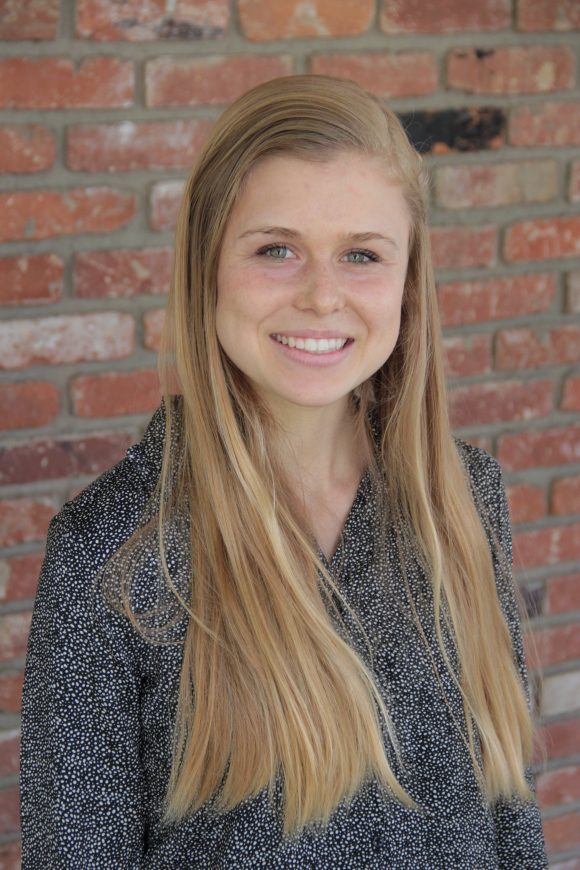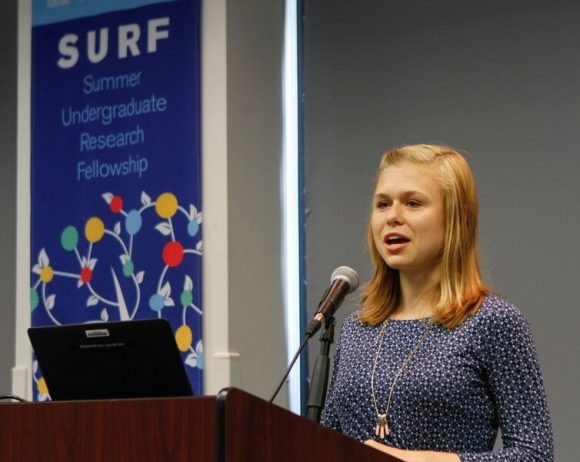
Student Profile: Morgan Kindel (’19) Research newbie, Morgan Kindel, expands her fascination with episodic memory through OURCA's Summer Undergraduate Research Fellowship '17
January 20, 2018
 Most would agree that personal memories bear influence on our everyday behaviors and decisions. But what if the way we remember is impaired? Does the strength of episodic memory, the type of memory that is responsible for creating personal recollections of daily life events, relate to the manifestation of maladaptive choices?
Most would agree that personal memories bear influence on our everyday behaviors and decisions. But what if the way we remember is impaired? Does the strength of episodic memory, the type of memory that is responsible for creating personal recollections of daily life events, relate to the manifestation of maladaptive choices?
This is the crux of the issue that junior Psychology and Political Science student, Morgan Kindel (’19), grapples with in her research. Specifically, Kindel posits that episodic memory may relate to the regulation of appetite in populations dealing with food restricting behaviors that often lead to life-threatening eating disorders, like anorexia nervosa.
Kindel began her investigative research under the mentor-ship of Dr. Jessica Walker, finding commonality in their mutual interest in the cognitive processes that contribute to memory. During the summer of 2017, Kindel was granted the opportunity to expand her interest into a pilot study during OURCA’s rigorous Summer Undergraduate Research Fellowship (SURF). This highly competitive eight week program affords student researchers the opportunity to delve deeper into their topics of interest in a fast-paced setting similar to graduate school, awarding them a fellowship of $3,000 in compensation for their demanding work. Additionally, SURF offers students weekly faculty seminars to expand their knowledge of what is happening in the Chapman research scene, as well as professional development seminars to assist the continuation of their research and careers.
Kindel’s summer research culminated in a pilot survey displaying various objects, some related to food and appetite, subsequently testing participants memory of those objects. Following the test, participants were asked about basic habits and attitudes surrounding food. According to Kindel preliminary results revealed, “people who have more restrained eating habits have worse memory.”
What conclusion then does this relationship point to? Kindel suggests episodic memory may influence the amount of food restrictive eaters decide to consume, as well as physiological cues of hunger. But Kindel says, “there’s still a lot we don’t know.” She plans to continue her research as an independent study in the Fall, potentially extending into her senior capstone project in psychology, and eventually graduate level research.
 When asked whether she plans to continue research as a career she answered simply and without a moment’s hesitation, “Yeah.” Kindel credits the SURF program for giving her the opportunity to explore the uncharted territory of research, as she “wasn’t sure” she would enjoy it because she had never done it before. With a smile Kindel said of her SURF experience, “I found I really liked it and enjoyed it.”
When asked whether she plans to continue research as a career she answered simply and without a moment’s hesitation, “Yeah.” Kindel credits the SURF program for giving her the opportunity to explore the uncharted territory of research, as she “wasn’t sure” she would enjoy it because she had never done it before. With a smile Kindel said of her SURF experience, “I found I really liked it and enjoyed it.”
If you, like Morgan, are new to research but wish to learn more, OURCA invites you to participate in one of the many opportunities for undergraduate research and creative activity available here on campus! Visit the OURCA website and don’t hesitate to reach out to our office to find out what OURCA can do for you!